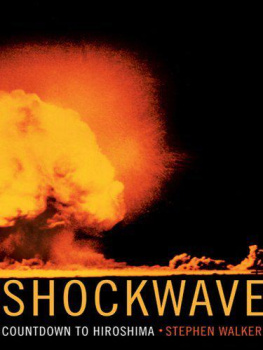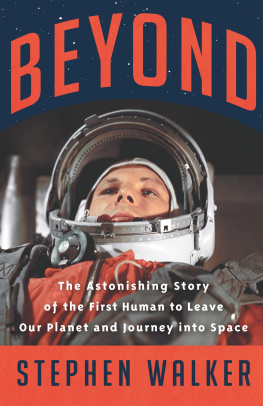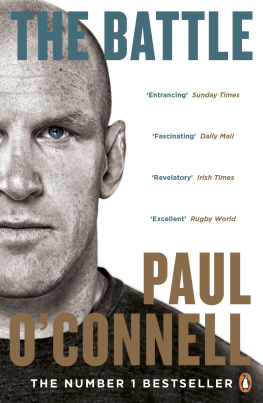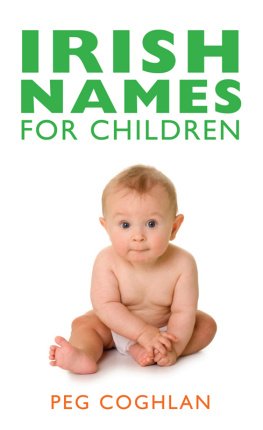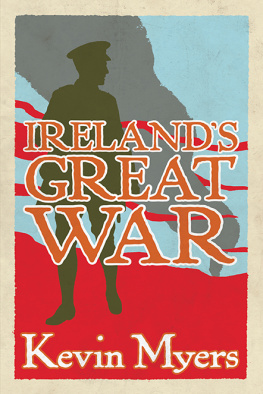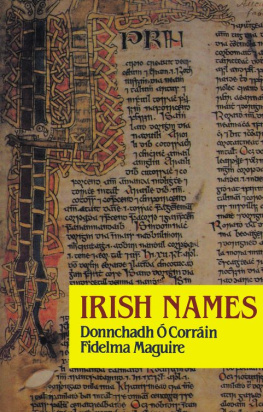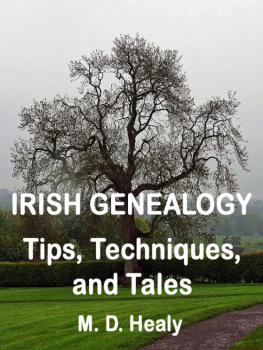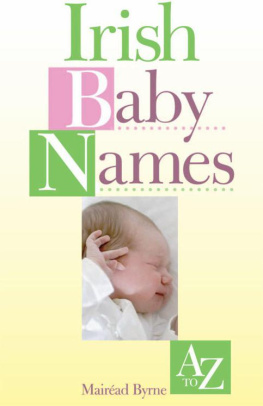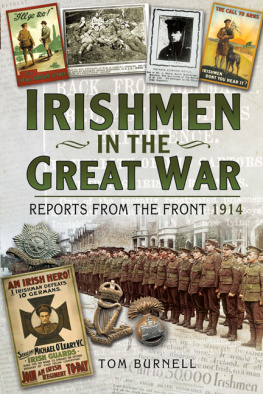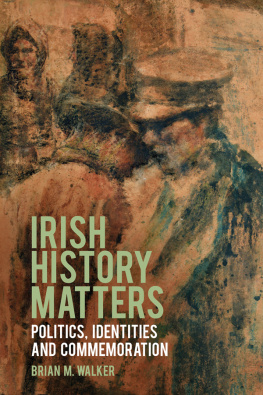Published in 2015 by Merrion Press
8 Chapel Lane
Sallins
Co. Kildare
2015 Stephen Walker
British Library Cataloguing in Publication Data
An entry can be found on request
978-1-78537-018-2 (paper)
978-1-78537-019-9 (PDF)
978-1-78537-021-2 (Epub)
978-1-78537-020-5 (Kindle)
Library of Congress Cataloging in Publication Data
An entry can be found on request
All rights reserved. Without limiting the rights under copyright reserved alone, no part of this publication may be reproduced, stored in or introduced into a retrieval system, or transmitted, in any form or by any means (electronic, mechanical, photocopying, recording or otherwise) without the prior written permission of both the copyright owner and the above publisher of this book.
Printed by Scandbook AB, Sweden.
Acknowledgements
F irstly, I would like to acknowledge all the family members of the men featured in Irelands Call, who answered my questions and requests for photographs and letters. Thank you for sharing your family history with a wider audience, and I hope you feel this book has been a worthwhile endeavour.
I wanted to write the stories of the men because I felt their sporting and military lives were worth recording. I was fascinated by the fact that well-known sportsmen were often prepared to give up their careers and volunteer for war, and I wanted to understand why so many came forward to enlist.
I am particularly grateful to the relatives of Basil Maclear, and my thanks go to John Maclear Bickford, Ann Maclear Tyler and Giles Bickford. I am also grateful to Eldrith Ward, who is a relative of Harry Sloan.
During my research I received enormous help from many archivists, in particular staff at the National Archives in London and at Emory University in the United States, who supplied me with copies of Robert Gregorys family letters.
I enjoyed working with Conor Graham at Merrion Press, who shared my enthusiasm for this book, and who showed great faith in this idea right from those early meetings back in 2013. His colleague Lisa Hyde was involved in those early discussions, and has been a great sounding board during this entire process.
I am also indebted to the design team who have produced a wonderful publication with a dramatic cover.
My long-suffering colleagues at BBC Northern Ireland and at the BBC in Westminster have always supported my writing projects, and some even claim to have read my previous books. A special thanks must go to all those in Broadcasting House in Belfast, particularly my fellow residents in the portacabin.
My friends Mark Carruthers and Philip Orr read a first draft of this work and offered helpful suggestions. I value their guidance, wise counsel and came to enjoy their grammar tutorials.
Details of matches and sporting achievements have been supplied by archivists who are attached to schools, colleges and sporting organisations across the UK and Ireland. Many administrators and officials work in a voluntary capacity and I was often taken aback by their enthusiasm for this project.
With the exception of the GAA players those chronicled in these pages were all international sportsmen. I know my selection may generate debate and if you have any observations or extra detail about the men please feel free to contact me on Twitter @IrelandsCall15.
Over the past two years many people from a wide variety of sporting bodies have all helped me put this book together.
My journey into the world of Irish cricket began with a phone call to Robin Walsh, a former BBC Northern Ireland controller who has been a leading light in Irish cricket for many years. He put me in touch with Edward Liddle, John Boomer and Barry Chambers, who were a great help.
My investigations into the archives of Irish rugby were aided by Willow Murray, who has an encyclopaedic knowledge of past players and events. I am also grateful to Shane Logan, Claire McAuley, Neil Brittan and Clodagh Miskelly at Ulster Rugby. Declan Meade and Declan OBrien at the IRFU and Gerry Hegarty and Henry Tighe at Monkstown Rugby Club were also very keen to help this project.
Peter Jackson pointed me in lots of good directions as I tried to track down photos and details of Irish hockey players, and Marshall Gillespie did a similar job with Irish football stars who fought in the Great War.
Donal McAnallan shared his vast knowledge of all things GAA and his project into the background of players who fought in the Great War was of enormous help. Martin Brennan was also a great source of detail relating to sporting figures in the mid-Ulster area. The distinguished journalist Dermot Gilleece was generous with sharing his research into Michael Moran and he helped me source some fantastic photographs.
My understanding of the rich history of Irish athletics was vastly improved when I made contact with Cyril Smith and Colm Murphy, and both men provided many important facts and figures. Conversations and emails with Niall Leinster, Ross OCarroll, Joel Taggart, Mike Cronin, Paul Rouse, Ken Kinsella, Ronan Kelly, Alex Gordon, Padraig Coyle, Richard Grayson, Ciaran Priestley, Greg Denieffe, Trevor Temple, Andrew Conn, Paul Treanor, William Blair, Ryan Feeney, Gerard Lawlor and Richard McElligot also proved helpful.
In Cork, information on the life of Vincent McNamara was kindly provided by Mike Holland, Catriona Mulcahy and Val Murphy, who unearthed some wonderful images of rugby players and teams from a century ago.
In Belfast, Keith Haines kept me right on Campbell Colleges role in the war and I am grateful for the support of staff including the headmaster, Robert Robinson, and Cathy Law. At the Public Records Office in Belfast I was ably assisted by Stephen Scarth and Ian Montgomery.
At Royal School Dungannon, Paul Kerr shared much information and at Portora Royal School in Enniskillen, Neil Morton put me in touch with Robert and Hannah Northridge, who kindly supplied details about Robert Balderston Burgess. At Bedford School, both Richard Garrett and Gina Worboys always remained cheerful every time I rang up with another question about the life of Basil Maclear.
I am grateful to Ben Blackmore for spending hours of his time chasing down key information at the National Archives in London. Other personal data and key newspaper articles were traced by Nigel Henderson, who is a first-class Great War researcher. As with my previous books, much of this work was written at the Tyrone Guthrie Centre in County Monaghan. It is a wonderful setting, and every time I go there I am bowled over by the atmosphere and the kindness of all the staff.
My family and close friends have put up with the distraction of Irelands Call over the past two years, and my father, brothers, Matthew and Geoff, and sister, Kate, were very supportive. My children, Grace, Jack and Gabriel were also very tolerant when our weekends and holidays were consumed with tales of sportsmen and soldiers from a bygone age. Without the blessing, love and encouragement of my wife this project would not have seen the light of day.
I wrote this book, but Katrin made it happen.
Stephen Walker, County Down, July 2015


